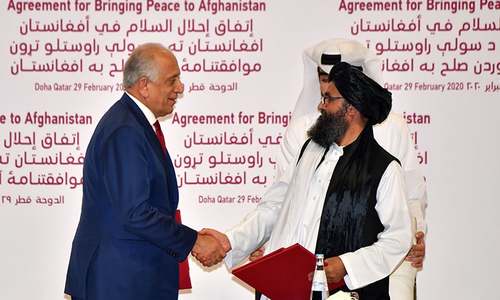WASHINGTON: UN Secretary-General Antonio Guterres called the agreement signed between the United States and Taliban on Saturday an important development in achieving a lasting political settlement in Afghanistan, while stressing the importance of sustaining a nationwide reduction in violence.
“The Secretary-General welcomes efforts to achieve a lasting political settlement in Afghanistan. Todays events in Doha and Kabul mark important developments in this regard,” UN spokesman Stephane Dujarric said in a statement.
“The Secretary-General stresses the importance of sustaining the nationwide reduction in violence, for the benefit of all Afghans. He encourages continued efforts by all parties to create an enabling environment for the intra-Afghan negotiations and a comprehensive peace process.”
In Brussels, the European Union said the landmark deal between the US and the Taliban, and a separate US-Afghanistan declaration, are “important first steps towards a comprehensive peace process” in Afghanistan.
EU calls deal ‘important first steps towards a comprehensive peace process’
The EU’s foreign policy chief Josep Borrell said in a statement that “the current opportunity to move towards peace should not be missed” and the bloc expected “Afghan-owned and Afghan-led negotiations to start without delay in an inclusive manner and aiming at a lasting peace”.
The signing of the US-Taliban accord in the Qatari capital Doha is historic, opening the way to a withdrawal of US troops from Afghanistan in return for Taliban security guarantees.
There are hopes it will put an end to nearly two decades of conflict in Afghanistan, where US-led forces have propped up the government in Kabul in the face of an unceasing Taliban insurgency.
To achieve peace, though, the accord will have to lead to intra-Afghan talks between the Afghan government and the Taliban.
The Afghan government was not directly involved in the negotiations resulting in Saturday’s deal signed in Doha. But US Defense Secretary Mark Esper was in Kabul to make a joint declaration with the government.
Borrell said the EU stood ready to help with an Afghan peace process in which “all political factions, where notably Afghan women and minorities as well as the civil society, are represented in a meaningful manner”.
Saudi Arabia also welcomed the peace agreement between the US and the Taliban on Saturday in a foreign ministry statement which said it hoped the deal would lead to a comprehensive and permanent ceasefire and nationwide peace in Afghanistan.
Published in Dawn, March 1st, 2020














































